Related Research Articles
This is a list of songs that have peaked at number one on the Billboard Hot 100 and the magazine's national singles charts that preceded it. Introduced in 1958, the Hot 100 is the pre-eminent singles chart in the United States, currently monitoring the most popular singles in terms of popular radio play, single purchases and online streaming.
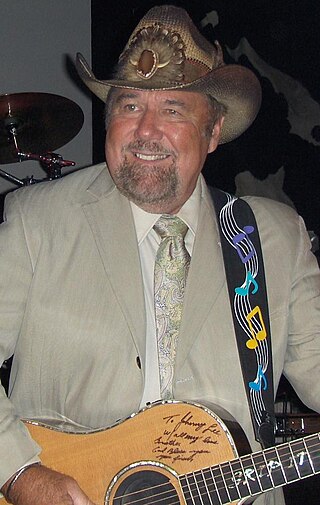
Johnny Lee is an American country music singer. His 1980 single "Lookin' for Love" became a crossover hit, spending three weeks at number 1 on the Billboard country singles chart while also appearing in the top 5 on the Billboard Hot 100 chart and top 10 on Billboard's Adult Contemporary chart. He racked up 17 top 40 country hits in the early and mid-1980s.

The Yellow Rose is an American soap opera television series that was broadcast on NBC from October 2, 1983, until May 12, 1984. The series was produced by Paul Freeman and was at least partly inspired by the more coltish elements of the soap opera Dallas, and dealt with the intrigues of the Texas-based Champion family who owned a 200,000-acre cattle and oil ranch called "The Yellow Rose".

"My Maria" is a song co-written by B. W. Stevenson and Daniel Moore. Lindy Blaskey, a music publisher at ABC/Dunhill Records, thought Moore had a possible hit with his verse and chorus, but couldn't get him to finish the song, so Blaskey took what Moore had so far and asked Stevenson to finish writing it with an additional verse. David Kershenbaum, Stevenson's producer at RCA, agreed with Blaskey that it sounded like a hit and produced and released "My Maria" as a single in August 1973. The song became a Top 10 hit, peaking at No. 9 on the US pop chart. It remained in the Top 40 for twelve weeks. In addition, "My Maria" spent one week at No. 1 on the US adult contemporary chart. The guitar portion of the track was played by Larry Carlton. A cover version by Brooks & Dunn reached No. 1 on the US country music chart and won the 1997 Grammy for Country Performance by a Duo or Group with Vocal.

"Brokenheartsville" is a song written by Donny Kees, Blake Mevis, Randy Boudreaux, and Clint Daniels and recorded by American country music singer Joe Nichols. It was released in November 2002 as the second single from Nichols' 2002 album Man with a Memory. The song became Nichols' first number one hit on the U.S. Billboard Hot Country Singles & Tracks chart and earned him his second consecutive Grammy nomination for Best Male Country Vocal Performance. The song also was later covered by Johnny Rodriguez on his 2011 album Live from Texas.
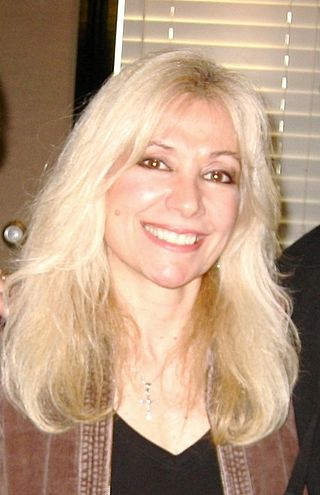
Lynne Connie Voorlas, known professionally as Lane Brody, is an American country music singer-songwriter, active since the early 1980s, best known for her 1984 Billboard-topping country hit "The Yellow Rose", and for the Oscar-nominated song "Over You" from the 1983 film Tender Mercies. Besides "The Yellow Rose", Brody has eleven other chart singles on the Billboard country charts.
"City Lights" is an American country music song written by Bill Anderson on August 27, 1957. He recorded it on a small Texas label called TNT Records in early 1958 to little acclaim. The song was first cut by Anderson in 1957 at the campus of the University of Georgia. In June 1958, Ray Price recorded it and his version hit number 1 on the Billboard Hot Country Songs singles chart in August 1958. Mickey Gilley's version also hit number 1 in June 1975.
"Funny How Time Slips Away" is a song written by Willie Nelson and first recorded by country singer Billy Walker. Walker's version was issued as a single by Columbia Records in June 1961 and peaked at number 23 on the Hot C&W Sides chart. The song has been featured in several live action films and television shows, such as in the first episode of the second season of AMC’s Better Call Saul and in the 2020 Netflix drama The Devil All the Time.
"That's the Way Love Goes' is a song written by Lefty Frizzell and Sanger D. Shafer and recorded by American country music artist Johnny Rodriguez. It was released in December 1973 as the second single from the album All I Ever Meant to Do Was Sing. The song was Rodriguez's fourth hit on the U.S. country chart and third number one in a row. The single stayed at number one for one week and spent a total of 14 weeks on the chart.
"Lady Lay Down' is a song written by Rafe Van Hoy and Don Cook, and recorded by American country music artist John Conlee. It was released in October 1978 as the second single from the album Rose Colored Glasses. The song was Conlee's second country hit and his first of seven number ones on the country chart. The single stayed at number one for one week.

"Mama He's Crazy" is a song written by Kenny O'Dell, and originally recorded by American country music duo The Judds. It was released in April 1984 as the second single from their debut January 1984 EP Wynonna & Naomi. The song was re-released on their full-length 1984 debut album Why Not Me. The song was their second hit and the first of 14 number one singles. The single went to number one for one week and spent a total of 14 weeks on the country chart. It was only the second country number one sung by a female duo; previously only The Davis Sisters featuring Skeeter Davis had made it to number one on the country chart in 1953 with their song "I Forgot More Than You'll Ever Know".

"Dixie Road" is a song written by Don Goodman, Pam Rose and Mary Ann Kennedy. It was first recorded by Leslie Utter in 1979. The King Henry version got to number 48 on the Hot Country Songs charts.
"Yellow Roses" is a song written and recorded by American country music artist Dolly Parton. It was released in July 1989 as the second single from the album White Limozeen. The song was Parton's 23rd number one country single. The single went to number one for one week and spent a total of 26 weeks on the country chart.
"Darlin'" is a song written in 1970 by English sax player Oscar Stewart Blandamer. It was first released under the title "Darling" by the British country band Poacher in 1978. It was later a chart hit for Frankie Miller and David Rogers. The track was subsequently recorded by numerous artists including Tom Jones, Barbara Mandrell, Smokie and Johnny Reid.
"I Love You Because" is a song written and recorded by country music singer-songwriter Leon Payne in 1949. The song has been covered by several artists throughout the years, including hit cover versions by Al Martino in 1963 and Jim Reeves in 1964.
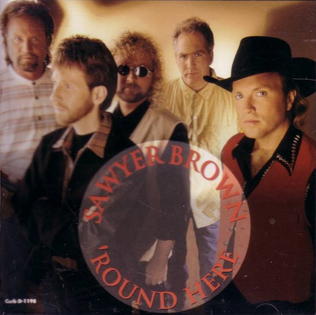
"'Round Here" is a song written by Mark Miller, Gregg Hubbard and Scotty Emerick, and recorded by American country music group Sawyer Brown. It was released in November 1995 as the second single from the album This Thing Called Wantin' and Havin' It All. The song reached number 19 on the Billboard Hot Country Singles & Tracks chart. It also peaked at number 19 on the Canadian RPM Country Tracks chart.
"Mendocino County Line" is a song written by Matt Serletic and Bernie Taupin, and recorded as a duet by American country music artists Willie Nelson and Lee Ann Womack. It was released in January 2002 as the lead-off single from Nelson's album The Great Divide. It was a Top 40 hit on the U.S. country chart, peaking at number 22. It was Nelson's first Top 40 hit on that chart since "Ain't Necessarily So" in 1990. It won the Grammy Award for Best Country Collaboration.
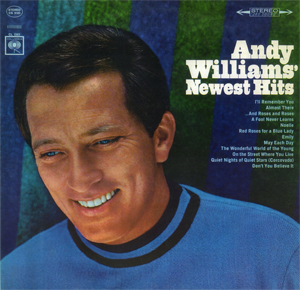
Andy Williams' Newest Hits is a compilation album by American pop singer Andy Williams that was released early in 1966 by Columbia Records and was the first LP to compile the singer's Columbia material. Seven of the 12 tracks had reached the charts in Billboard magazine, and another had been released as a single in the UK. Three album cuts were also included along with a recent B-side.
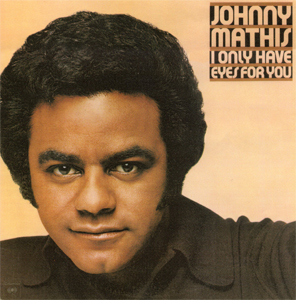
I Only Have Eyes for You is an album by American pop singer Johnny Mathis that was released on May 10, 1976, by Columbia Records and included two new songs, "Yellow Roses on Her Gown" and "Ooh What We Do", which was written specifically for him, as well as a contemporary arrangement of the 1934 title track that foreshadowed his recordings of standards that incorporated a disco beat a few years later.

"I Can't Help It (If I'm Still in Love with You)" is a song written and originally recorded by Hank Williams on MGM Records. It hit number two on the Billboard country singles chart in 1951. In his autobiography, George Jones printed the first six lines of the song and stated, "Its lyrics couldn't be more simple - or profound."
References
- 1 2 3 4 Whitburn, Joel (2008). Hot Country Songs 1944 to 2008. Record Research, Inc. p. 236. ISBN 978-0-89820-177-2.
- ↑ Jack Hurst (1986-10-02). "Lane Brody Takes Songs to "Heart"". The Chicago Tribune . Archived from the original on July 29, 2012.
- ↑ Joe Edwards (1985-04-07). ""Yellow Rose" singer has jingled her way to fame". Wilmington Morning Star.
- ↑ Whitburn, Joel (2008). Hot Country Songs 1944 to 2008. Record Research, Inc. p. 60. ISBN 978-0-89820-177-2.
- ↑ "Johnny Lee Chart History (Hot Country Songs)". Billboard.
- ↑ "1985 Talent Almanat" (PDF). Billboard. Vol. 96, no. 51. December 22, 1984. p. TA-23. Retrieved June 15, 2021.